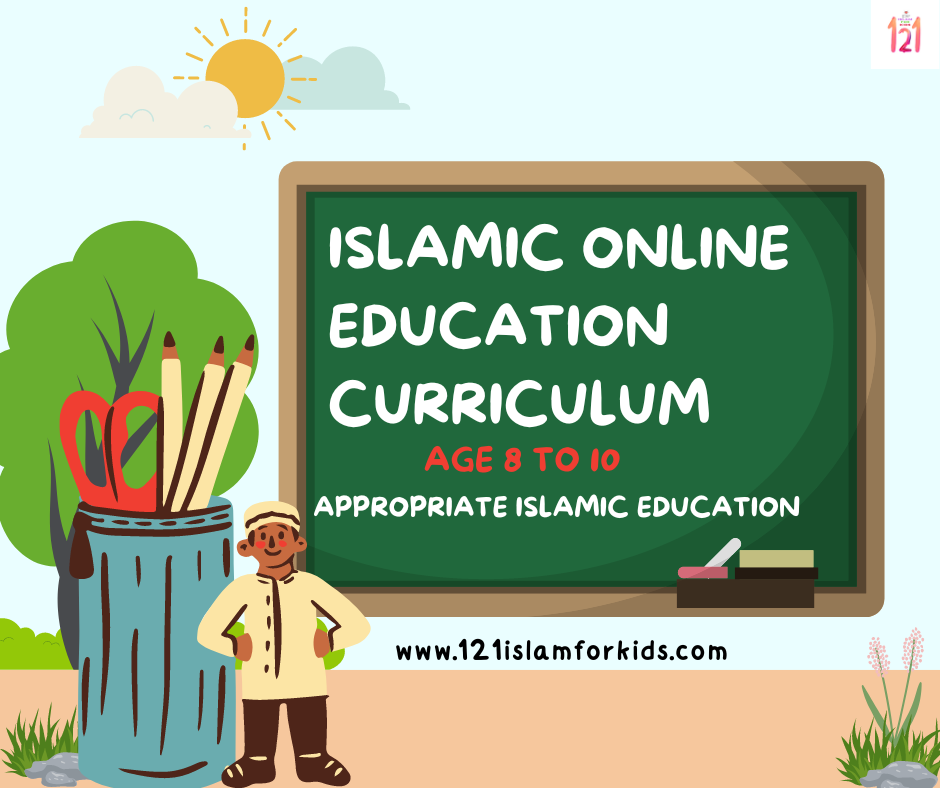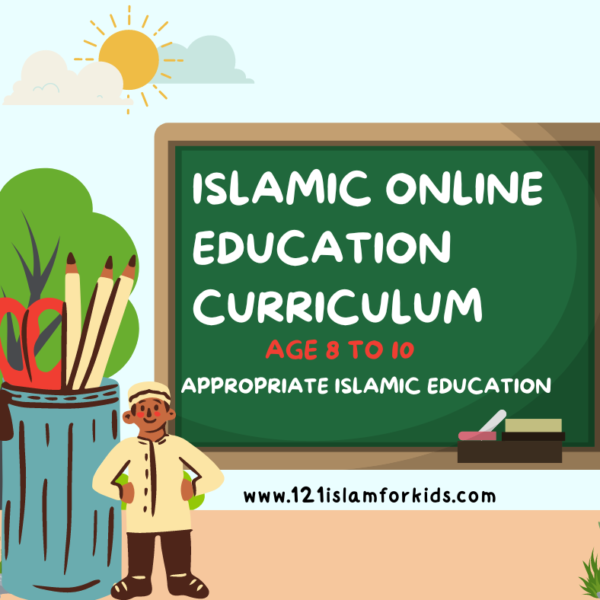Islamic Online Education Curriculum for Children Aged 8 to 10: Building Strong Foundations for 21st-Century Muslims
Table of Contents

Introduction:
The 121 Islam for Kids Online Institute is dedicated to providing comprehensive and age-appropriate Islamic education for Muslim children aged 8 to 10 years old. Our curriculum is designed to instill a strong understanding of core Islamic beliefs, principles, and values while also fostering respect for diversity and promoting good character and manners. With a focus on interactive and engaging methods, our program aims to empower children to become confident, compassionate, and responsible young Muslims.
Online Education Curriculum Modules:
Module 1: Basic Fiqh
Objective: To introduce children to the fundamental principles of Islamic Jurisprudence (Fiqh) and guide them in applying Islamic teachings to their daily lives.
1.1 Five Pillars of Islam:
- Teach the significance of Shahada (Declaration of Faith), Salah (Prayer), Zakat (Charity), Sawm (Fasting), and Hajj (Pilgrimage).
- Discuss how these pillars strengthen one’s connection with Allah and the community.
1.2 Wudu and Salah:
- Explain the importance of cleanliness (Taharah) and how to perform Wudu (ablution).
- Guide children through the steps of performing Salah and its importance in daily life.
Module 2: Core Islamic Beliefs
Objective: To provide children with a strong understanding of the foundational beliefs of Islam.
2.1 Oneness of Allah (Tawheed):
- Teach the concept of Tawheed and the importance of monotheism in Islam.
- Introduce the 99 Names of Allah (Asma-ul-Husna) and their meanings.
2.2 Belief in Angels, Prophets, Scriptures, Books, and Day of Judgment:
- Introduce the concept of angels and their roles in Islam.
- Teach about the important prophets and their books, including Prophet Muhammad (PBUH), and the divine scriptures.
- Fate and Day of Judgment
Module 3: Introduction to Other World Religions
Objective:
To promote interfaith understanding and respect for diversity while reinforcing the uniqueness of Islamic beliefs. You can read this topic in detail ‘Understanding Religion and Its Role in Our Lives – A Guide for Muslim Kids (8-10)’
3.1 Comparative Religion:
- Introduce children to the basics of major world religions, such as Christianity, Judaism, and Hinduism.
- Emphasize similarities and differences between these religions and Islam.
Module 4: Tafseer of Short Surahs
Objective: To help children understand the meanings and lessons behind short surahs (chapters) from the Quran.
4.1 Surah Al-Fatiha:
- Explore the significance of Surah Al-Fatiha as the opening chapter of the Quran.
- Explain the meanings and implications of the verses within this surah.
4.2 Surah Al-Asr and Surah Al-Ikhlas:
- Provide a detailed explanation of Surah Al-Asr and its relevance to time management and mindfulness.
- Elaborate on the profound meanings of Surah Al-Ikhlas, emphasizing the concept of Tawheed.
Module 5: Explanation of Hadiths with Stories and Worksheets
Objective: To engage children with stories and activities that illustrate the wisdom and guidance found in Hadiths.
5.1 30 short Hadiths:
- Share Hadiths that highlight the topics of hadith with an explanation.
- Encourage children to emulate the Prophet’s (PBUH) compassionate character.
5.2 Story related to the topic
- We will tell stories from Seerah and prophets stories related to the topic
- We encourage students to discuss and reflect on the lesson learned from the story
- We encourage students to share the hadith and story with others.
5.3 Worksheets and Interactive Activities:
- Provide interactive worksheets and activities to reinforce the understanding of Hadiths and their practical application.
Module 6: Seerah of Prophet Muhammad (PBUH) and Other Prophets
Objective: To introduce children to the life and teachings of Prophet Muhammad (PBUH) and other esteemed prophets.
6.1 Seerah of Prophet Muhammad (PBUH):
- Narrate key events from the life of Prophet Muhammad (PBUH), highlighting his character and teachings.
- Emphasize the importance of following his example in daily life.
6.2 Stories of Other Prophets:
- Introduce stories of Prophet Ibrahim, Prophet Musa, Prophet Isa, and others, underscoring the common message of monotheism and morality.
Module 7: Islamic Manners and Etiquettes
Objective: To instill good manners, etiquette, and the importance of respecting elders and peers.
7.1 Dress Code in Islam:
- Teach the significance of modesty and appropriate Islamic dress for boys and girls.
- Explain the concept of hijab and its various interpretations.
7.2 Rights of Parents and Elders:
- Highlight the respect and kindness that children should show towards their parents and elders.
- Encourage children to be grateful for their caregivers’ efforts.
7.3 manners – 121 Islam for Kids:
- Promote kindness, honesty, and integrity in children’s interactions with others.
- Emphasize the value of empathy and compassion in Islam.
Conclusion:
At the 121 Islam for Kids Online Institute, we are dedicated to providing an interactive and all-inclusive curriculum that will help shape young Muslim minds. Our program is designed to focus on fundamental Islamic values, ethics, and manners, which will help to establish a strong foundation in faith and character. We also aim to instill a sense of open-mindedness and respect towards diverse beliefs, thereby encouraging children to actively participate as responsible members of their communities and the world at large. Through our curriculum, we strive to equip the next generation with the knowledge and tools needed to uphold the principles of Islam and make positive contributions to society.
How does this guide Islamic online education curricula? Let us know in the Comment box
Do you want to add any other module to this list?

Leave a Reply
You must be logged in to post a comment.